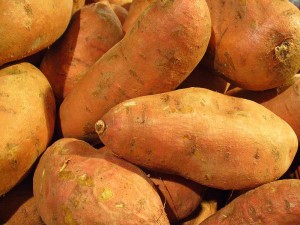
The humble sweet potato. How “natural” is it? (Credit: https://commons.wikimedia.org/wiki/File:Ipomoea_batatas_006.JPG)
Michael Pollan recently wrote a piece in The New York Times discussing why nothing is truly natural anymore. I don’t always agree with Pollan’s views, but this piece resonated, as this idea has been tossed around quite frequently. Pollan spoke about the word ‘natural’ in context of the food industry, but the argument has much wider applications, especially when it comes to labeling other consumer goods such as cosmetics and cleaning supplies. Do-it-yourself (DIY) creations are becoming increasingly popular, and many websites and books that offer DIY solutions emphasize how ‘natural’ homemade soaps and face washes are, as opposed to the chemically laden commercial products. I’ve addressed the point before from the angle of an anti-chemophobic, but I’m starting to realize that now it may be a more philosophical and psychological question and less of an issue of mere logic. How do we define natural in a world where nearly everything is processed, synthetic, or modified? And more importantly, why do we feel the need to gravitate towards anything labeled as natural?
One of the clearer examples of this dilemma is through food. Genetically engineered (GE) food has been Public Enemy No. 1 for quite some time now, with many people likening it to ‘Frankenfood’ and decrying it as unnatural and unsafe. But a recent comparison between GE food and the currently popular Paleo diet shows how difficult it is to make the distinction between ‘natural’ and ‘unnatural.’ Natural genetic mixing and selective breeding have been used for the past 10,000 years. So why are modern GE foods shunned for doing the same thing, only more effectively? Much of the fear stems from intuitive reasons, as discussed in a new Trends in Plant Science paper. Titled ‘Fatal Attraction: the Intuitive Appeal of GMO Opposition,’ the paper found that intuitive and intentional thinking on genetically modified organisms (GMOs) often causes elevating the status of nature and ‘naturally’ grown foods while denigrating GMOs to an ‘unnatural’ level that should be eschewed.
The topic become even more convoluted a few weeks ago when, in a boon to food scientists and biotechnologists everywhere, it was announced that sweet potatoes are a ‘natural GMO,’ due to the fact that they are found to contain certain genes from the Agrobacterium bacterium. These genetic sequences were detected in 291 different sweet potato varieties, and were also determined to be active in the sweet potato, demonstrating that genetic modification can happen without human intervention. One of the researchers involved with the project made the point that “in comparison to ‘natural’ gmos, that are beyond our control, human-made gmos have the advantage that we know exactly which characteristic we add to the plant.” So does this make human-developed GMOs more natural or sweet potatoes less natural? The answer I’d predict the majority of people to pick speaks volumes about how deeply we are governed by the intuitive thinking mentioned previously.
The same school of thought also goes for chemicals; we tend to get riled up around the word ‘chemical’ though in reality a naturally occurring chemical is not inherently safer than a man-made chemical. And in many cases to compensate for the ‘toxins’ we consume and are exposed to, we turn to excess in-take of anti-oxidants in the form of synthetic vitamins. Ironically enough, it was recently determined that the long-term effect of excess intake of antioxidants are not effective at preventing cancer and in some instances may actually increase the risk of cancer. Vaccines are shunned for similar reasons, with the reasoning that our ‘natural’ immune system will be sufficient to protect us, and that we should not be injecting synthetic chemicals into our bodies.
Our daily lives have become ingrained with synthetic products and technologies to the point that we seek ‘natural’ as a breath of fresh air, a return to simpler times. But ‘natural’ is no longer simple, especially not to define. It has merely become a marketing ploy, a buzzword amongst Whole Foods shoppers. We can no longer in good conscious continue to label items as ‘natural’ and assume that the label is synonymous with ‘healthy.’ We are nowhere near natural anything anymore but, high fructose corn syrup/similar products aside, shouldn’t we be proud of this? Proud that we have engineered food to feed the rapidly increasing population and help malnourished populations all over the world, that we have learned how to make products and medicines that have saved countless lives. We no longer need ‘natural,’ but we do need products that are safe, well-researched, and sustainable, so let’s enjoy the unnatural fruits of our labors.
